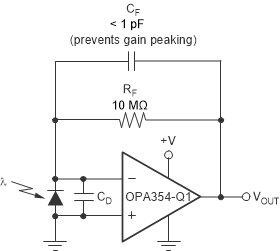ZHCSI77F June 2009 – May 2018 OPA2354A-Q1 , OPA354A-Q1 , OPA4354-Q1
PRODUCTION DATA.
7.3.8 Wideband Transimpedance Amplifier
Wide bandwidth, low-input bias current, and low input voltage and current noise make the OPAx354-Q1 family of devices is designed as a wideband photodiode transimpedance amplifier for low-voltage single-supply applications. Low-voltage noise is important because photodiode capacitance causes the effective noise gain of the circuit to increase at high frequency.
The key elements to a transimpedance design, as shown in Figure 36, are the expected diode capacitance [including the parasitic input common-mode and differential-mode input capacitance (2 + 2) pF for the OPAx354-Q1], the desired transimpedance gain (RF), and the gain-bandwidth product (GBW) for the OPAx354-Q1 family of devices (100 MHz). With these three variables set, the feedback capacitor value (CF) is set to control the frequency response.
 Figure 36. Transimpedance Amplifier
Figure 36. Transimpedance Amplifier To achieve a maximally flat second-order Butterworth frequency response, set the feedback pole as shown in Equation 1.

Typical surface-mount resistors have a parasitic capacitance of approximately 0.2 pF that required deduction from the calculated feedback capacitance value.
Use Equation 2 to calculate the bandwidth.

For even higher transimpedance bandwidth, use the high-speed CMOS OPA355-Q1 (200-MHz GBW) or the OPA655-Q1 (400-MHz GBW).